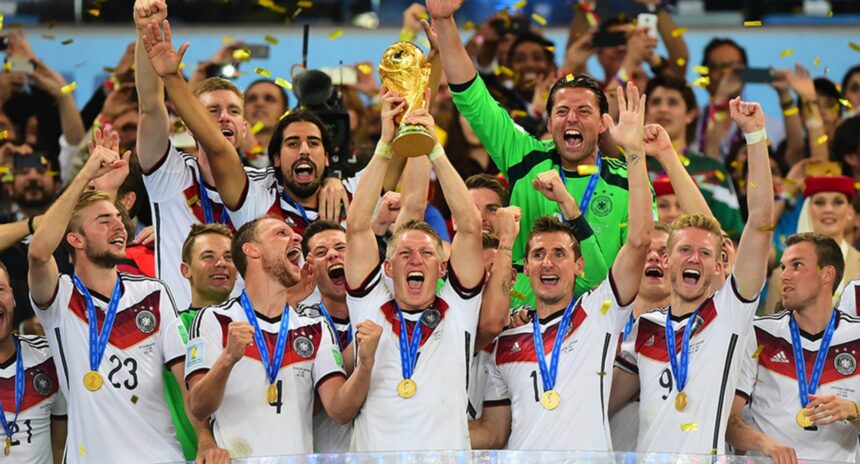Introduction to Germany’s History at the FIFA World Cup
When it comes to football, few nations can match the rich and storied history of Germany. From their early struggles on the world stage to becoming one of the most dominant forces in international soccer, Germany’s journey at the FIFA World Cup is filled with unforgettable moments that have left fans around the globe in awe.
Join us as we take a trip down memory lane, exploring Germany’s rise to greatness and reliving some of their most memorable matches and players. From nail-biting victories to heartbreaking defeats, this is an adventure you won’t want to miss! So, grab your scarf, paint your face black, red, and gold – let’s dive into Germany’s incredible journey at the FIFA World Cup!
The Early Years: 1930-1966
In the early years of the FIFA World Cup, Germany’s journey began with mixed results. Their first appearance came in 1934 when they made it to the quarterfinals before being eliminated by Czechoslovakia. Four years later, in France, they reached the semifinals but were defeated by Italy.
It wasn’t until after World War II that Germany had their breakthrough moment at the tournament. In 1954, they shocked the world by defeating heavily favored Hungary in what became known as “The Miracle of Bern.” This victory marked Germany’s first-ever World Cup title and ignited a passion for football within the country.
However, success wouldn’t come easily for Germany in subsequent tournaments. They failed to advance past the group stage in both 1958 and 1962. It was only in 1966 that they managed to reach another final but lost to England despite controversy surrounding Geoff Hurst’s disputed goal.
During these early years, several players left lasting impressions on fans worldwide. The likes of Fritz Walter, Helmut Rahn, and Uwe Seeler showcased their talents on football’s biggest stage and laid the foundation for future German stars.
Germany’s performance during this period set them up for even greater success in decades to come. Despite some ups and downs along the way, their early experiences at the FIFA World Cup shaped their determination and desire to become a dominant force on football’s grandest stage.
Rise to Dominance: 1970-1990
The 1970s marked the beginning of Germany’s ascent to football greatness. After a disappointing semi-final loss in 1966, the team was determined to prove themselves on the world stage. Led by legendary players like Franz Beckenbauer and Gerd Muller, Germany showcased their talents and tactical brilliance.
In 1974, they hosted the World Cup and triumphed over fierce opponents such as Brazil and Netherlands to claim their second title. The victory solidified Germany’s status as one of the most formidable teams in international football.
But it was during the 1980s that Germany truly established dominance. With stars such as Karl-Heinz Rummenigge and Lothar Matthaus leading the way, they reached three consecutive World Cup finals. Although they narrowly missed out on lifting the trophy in both 1982 and 1986, their performances were nothing short of exceptional.
In 1990, under coach Franz Beckenbauer’s guidance once again, West Germany secured their third World Cup title by defeating Argentina in a thrilling final. This triumph cemented Germany’s place among footballing giants.
Throughout this period of rise to dominance, Germany exhibited an unwavering commitment to teamwork, discipline, and innovation. Their success not only brought joy to millions of fans but also inspired future generations of German players who would continue to make their mark on world football.
Recent Success: 2006-2018
The years between 2006 and 2018 marked a period of sustained success for the German national football team. It was during this time that Germany solidified its position as one of the world’s most formidable footballing nations.
In the 2006 World Cup, held on home soil, Germany made it all the way to the semi-finals before narrowly losing to Italy in a memorable match. Despite falling short of reaching the final, their performance captivated fans and showcased Germany’s potential.
Four years later, at the 2010 World Cup in South Africa, Germany once again displayed their dominance by finishing in third place. The team exhibited an impressive attacking style of play coupled with exceptional teamwork.
Germany’s crowning moment came in Brazil during the 2014 World Cup when they emerged as champions after defeating Argentina in a thrilling final. Led by coach Joachim Löw and inspired performances from players like Thomas Müller and Mario Götze, Die Mannschaft demonstrated skillful possession-based football that left their opponents struggling to keep up.
Even though they couldn’t replicate their success in Russia four years later, where they were eliminated from group stage itself; there is no denying that Germany had established themselves as consistent contenders on any FIFA World Cup stage.
This recent run of success has not only brought glory to German football but has also united fans across the country. The national team has become a symbol of pride and inspiration for aspiring young players who dream of representing their nation on such grand stages.
As we look ahead to future tournaments, it is clear that Germany will continue to be a force to be reckoned with at the FIFA World Cup. With talented young stars emerging within domestic leagues and experienced veterans leading the charge, there is every reason to believe that more memorable moments await us in upcoming tournaments!
Memorable Matches and Players
When it comes to Germany’s history at the FIFA World Cup, there have been plenty of memorable matches that have etched themselves into football folklore. One such game took place in 1954 when Germany faced off against Hungary in the final. Against all odds, Germany emerged victorious, overcoming a 2-0 deficit to claim their first World Cup title.
Another unforgettable match came in 1974 when Germany faced fierce rivals Netherlands in the final. It was a hard-fought battle between two talented teams, but ultimately Germany came out on top with a 2-1 victory to secure their second World Cup trophy.
In more recent years, one match that stands out is the thrilling encounter between Germany and Brazil in the semi-finals of the 2014 tournament. Dubbed as “The Mineirazo,” this game will forever be remembered for its astonishing scoreline – Germany demolished Brazil with an unprecedented 7-1 win.
When talking about standout players for Germany at the World Cup, it is impossible not to mention Miroslav Klose. The legendary striker holds multiple records including being the all-time leading goal scorer at World Cups and having scored crucial goals throughout his career.
Another player who left an indelible mark on German football is Franz Beckenbauer. Known as “Der Kaiser,” Beckenbauer captained West Germany to their first-ever World Cup triumph in 1974 and later went on to coach them to another victory as manager.
These are just a few examples of many remarkable moments from over the years that showcase why German football has earned its reputation as one of powerhouses on the world stage.
Impact of Germany’s World Cup Success on the Country
Germany’s success at the FIFA World Cup has had a profound impact on the country, both on and off the field. The national team’s victories have brought immense joy and pride to German fans, fostering a sense of unity and camaraderie among its citizens.
On a sporting level, Germany’s triumphs have elevated the country’s status in international football. Their impressive performances have showcased their talent, skill, and tactical prowess to the world. This success has not only boosted Germany’s reputation as a footballing powerhouse but has also attracted talented young players who aspire to represent their nation at this prestigious tournament.
Beyond sport, Germany’s World Cup success has also had significant social and cultural implications. It serves as a source of inspiration for many individuals across the country, encouraging them to pursue their dreams with determination and perseverance. Additionally, it fosters patriotism and national pride among Germans from all walks of life.
Economically speaking, hosting or performing well in major tournaments often leads to increased tourism revenue and investment opportunities for host nations. Germany experienced this firsthand when they hosted the 2006 World Cup. The influx of visitors during that time contributed significantly to its economy while leaving lasting positive impressions on tourists about German hospitality.
Moreover, Germany’s success at the World Cup transcends borders; it unites people from diverse backgrounds under one common passion: football. When Germany competes in such global events, it brings together communities within the country as well as those living abroad who share an affinity for German culture or heritage.
Conclusion
Germany’s history at the FIFA World Cup is one filled with triumphs, unforgettable moments, and a legacy that has shaped the country’s football culture. From their humble beginnings in the early years to their rise to dominance and recent success, Germany has established themselves as a force to be reckoned with on the world stage.
Throughout the years, Germany has showcased some truly memorable matches and players. From Gerd Muller’s goal-scoring prowess in 1970 to Miroslav Klose breaking records in 2014, these individuals have left an indelible mark on German football history. The team’s ability to come together and perform under pressure is what sets them apart from others.
Beyond individual achievements, Germany’s success at the World Cup has had a profound impact on the country itself. Football unites people from all walks of life and brings communities together. The national team’s victories have instilled a sense of pride among Germans while also promoting unity within the nation.
The World Cup successes have also boosted tourism for Germany as fans flock from around the globe to witness this footballing powerhouse firsthand. This influx of visitors brings economic benefits not only during tournament years but also through increased interest in German football clubs throughout other leagues.
Previous Post: The Samba Kings: Brazil’s Legacy and Success at the FIFA World Cup








